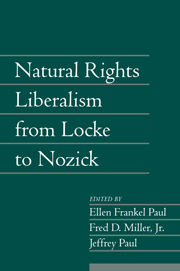Book contents
- Frontmatter
- Contents
- Introduction
- Acknowledgments
- Contributors
- The Political Needs of a Toolmaking Animal: Madison, Hamilton, Locke, and the Question of Property
- Natural Rights and Imperial Constitutionalism: The American Revolution and the Development of the American Amalgam
- There Is No Such Thing as an Unjust Initial Acquisition
- Nozick and Locke: Filling the Space of Rights
- Toward a Theory of Empirical Natural Rights
- History and Pattern
- Libertarianism at Twin Harvard
- Sidney Hook, Robert Nozick, and the Paradoxes of Freedom
- Begging the Question with Style: Anarchy, State, and Utopia at Thirty Years
- The Shape of Lockean Rights: Fairness, Pareto, Moderation, and Consent
- One Step Beyond Nozick's Minimal State: The Role of Forced Exchanges in Political Theory
- Natural Rights and Political Legitimacy
- Consent Theory for Libertarians
- Prerogatives, Restrictions, and Rights
- Index
Consent Theory for Libertarians
Published online by Cambridge University Press: 06 July 2010
- Frontmatter
- Contents
- Introduction
- Acknowledgments
- Contributors
- The Political Needs of a Toolmaking Animal: Madison, Hamilton, Locke, and the Question of Property
- Natural Rights and Imperial Constitutionalism: The American Revolution and the Development of the American Amalgam
- There Is No Such Thing as an Unjust Initial Acquisition
- Nozick and Locke: Filling the Space of Rights
- Toward a Theory of Empirical Natural Rights
- History and Pattern
- Libertarianism at Twin Harvard
- Sidney Hook, Robert Nozick, and the Paradoxes of Freedom
- Begging the Question with Style: Anarchy, State, and Utopia at Thirty Years
- The Shape of Lockean Rights: Fairness, Pareto, Moderation, and Consent
- One Step Beyond Nozick's Minimal State: The Role of Forced Exchanges in Political Theory
- Natural Rights and Political Legitimacy
- Consent Theory for Libertarians
- Prerogatives, Restrictions, and Rights
- Index
Summary
INTRODUCTION
It is curious that in libertarian political philosophy there is almost no discussion of the traditional problem of political obligation. I call this “curious” not only because of my own belief that this problem is centrally important in political philosophy, but also because libertarians would seem to be oriented in political philosophy in a way that would make the problem of political obligation particularly central for them. After all, many libertarians regularly appeal to the insights of the so-called classical liberals, such as Locke, for whom the problem obviously occupied center stage. And many libertarians, like many of those classical liberals whose works they admire, both (a) insist on fundamental individual rights of personal liberty and property (and regard as uniformly unjustified selfinterested or paternalistic or moralistic infringement of those rights) and (b) still accept (unlike the minority strain of libertarian anarchists) the possibility of morally legitimate political societies. This seems to make the question of the source and nature of (and the limits on) our obligations to governments or fellow citizens absolutely basic and not at all easy, requiring a kind of delicate balancing act of affirming strong individual rights while still accepting justified political obligations. Finally, of course, libertarians’ familiar emphasis on freedom of contract, and more generally on free consent as the most plainly legitimate basis for libertylimiting arrangements (such as those involved in political societies), makes it seem natural for libertarians to centrally defend, with Locke, a consent theory of political obligation.
Strangely, though, libertarian political philosophers have not participated, by and large, in philosophical debates about political obligation, nor do libertarian political writings regularly even mention the problem in passing.
- Type
- Chapter
- Information
- Natural Rights Liberalism from Locke to Nozick , pp. 330 - 356Publisher: Cambridge University PressPrint publication year: 2004

